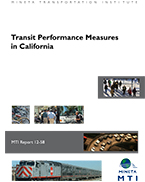- 408-924-7560
- mineta-institute@sjsu.edu
- Donate
Transit Performance Measures in California
This research is the result of a California Department of Transportation (Caltrans) request to assess the most commonly available transit performance measures in California. Caltrans wanted to understand performance measures and data used by Metropolitan Planning Organizations (MPOs) and transit agencies to help it develop statewide measures. This report serves as a summary reference guide to help Caltrans understand the numerous and diverse performance measures used by MPOs and transit agencies in California. First, investigators review the available literature to identify a complete transit performance framework for the purposes of organizing agency measures, metrics, and data sources. Next, they review the latest transit performance measures documented in planning reports for the four largest MPOs in California (San Francisco Bay Area, Los Angeles, San Diego, and Sacramento). Researchers pay special attention to the transit performance measures used by these MPOs, because these measures are available for the majority of California’s population. Finally, investigators summarize 231 performance measures used by a total 26 local transit agencies in the State of California, based on transit planning documents available on the internet.
CAROLINE RODIER, PhD
Caroline Rodier, PhD is a Research Associate at the Mineta Transportation Institute and the Associate Director of the Urban Land Use and Transportation Center—and a Research Scientist—at the Institute of Transportation Studies, University of California, Davis. Dr. Rodier’s major areas of research include transport, land use, and environmental planning and policy analysis; she has extensive experience applying land use and transport models to inform public investment, planning, and policy decisions. She has managed the development of activity-based microsimulation travel models for the State of California and the San Joaquin Valley, as well as California’s PECAS land-use model. Dr. Rodier has expertise in the design and implementation of research projects that routinely make use of expert and stakeholder interviews, focus groups, and travel behavior surveys. Her research includes parking information and pricing technology pilot projects (most recently SFpark); shared-use modes to facilitate first- and last-mile access to transit; travel needs and mobility solutions for diverse populations in California (e.g., the elderly and immigrants); traffic safety impacts of Variable Message Signs; and the scoping plan for California’s landmark climate change legislation, Assembly Bill 32. Dr. Rodier has also conducted reviews of legal and institutional challenges in the areas of automated speed enforcement, low speeds modes (e.g., Segways and neighborhood electric vehicles), and the provision of public parking for carsharing services. Most recently, Dr. Rodier led the development of the content for scenario activities used in the workshop on Automated Vehicles within the Built Environment: 2020, 2035, and 2050 at the Automated Vehicle Symposium 2014 and 2015. She currently serves as the Chair of the Transportation Research Board’s Emerging and Innovative Public Transport and Technologies Committee. She holds a BA in U.S. History from Barnard College at Columbia University, and an MS in Community Development and a PhD in Ecology from the University of California, Davis.
EMILY ISSAC, PhD
Emily Isaac is a Research Assistant at the Institute of Transportation Studies at the University of California, Davis. Since 2014, she has focused her research on transportation network companies and the market for on-demand transportation services. In 2015, she graduated from the University of California, Davis with a bachelor’s degree in Community and Regional Development.
-
Contact Us
San José State University One Washington Square, San Jose, CA 95192 Phone: 408-924-7560 Email: mineta-institute@sjsu.edu






